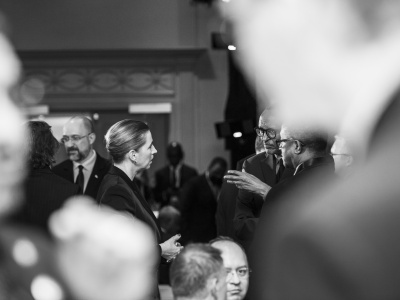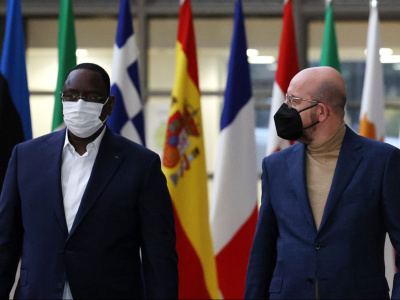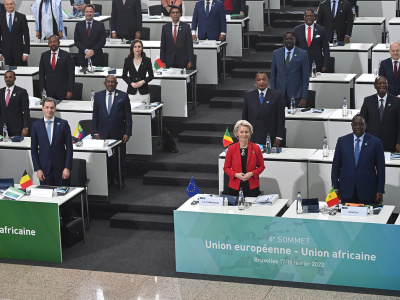
Healing the AU-EU partnership in turbulent times: Views from Europe
Authors
We recently asked African and European policymakers for their unfiltered views on where the AU-EU partnership stands and to propose some practical steps to revive the relationship in a turbulent global context. Reflecting on our discussion with African ambassadors, my colleague Lidet Tadesse argued that both parties must have the courage to envision a partnership beyond money, while I propose four ways to repair the partnership after our meeting with European policymakers.
European external action and development policy are changing and so is Africa’s stance towards the world. The Russian war in Ukraine has absorbed much of Europe’s political energy. Ensuing deeper geopolitical competition has intensified a pre-existing European motion towards an interest-driven external engagement and a stronger link between domestic and external EU policies.
Africa has shown more agency and autonomy in international fora, not least about what positions to take on the war. Countries on the continent have become more assertive towards Europe and wish to keep the doors open to multiple partners. They have intensified their quest for national sovereignty and have become much more vocal and critical of Europe’s stance towards them.
The implications of these shifts for the AU-EU partnership and broader intercontinental relationships are still to unfold fully. So far, most analysts have concentrated on the grievous state of the partnership in the aftermath of the COVID-19 pandemic and the Russian war against Ukraine, despite a seemingly successful summit in February 2022.
Much less thought has gone into how the partnership could instead blossom, or at least progress, and what the space for healing the relationship between Europe and Africa is. Below I present some of my main takeaways from our meeting with European policymakers, focusing on ideas to move the relationship forward.
1. Nurture a more nuanced understanding of African positions
Europe’s initial overreaction to African countries’ stance on Russia’s invasion of Ukraine has cost Europe quite some political capital in Africa. “In hindsight”, one of our guests admitted, “that was a narrow way to look at the relationship”.
In recent months, some European policymakers seem to have gained a better understanding of Africa’s national interests and positioning in international fora. Our meeting suggested that some of them are more reflective and open about what needs to change in Europe and Africa. This disposition is not necessarily commonplace among European policymakers, but it certainly marks a change of attitude and should be nurtured for the sake of achieving a more mature partnership.
2. Clearly articulate interests on both sides of the partnership
A more nuanced understanding of Africa’s foreign relations traditions – a resurgent non-alignment movement for example – and its interests in preserving relationships with multiple countries would give more breath and confidence to the intercontinental relationship. Europe should also not take African support for granted.
What would also go a long way is an honest admission of European interests and an articulation of the fact that policies and positions, including on currently uncomfortable areas such as gender equality, the EU Green Deal or agriculture, are often rooted in demands from domestic constituencies. They arise as a result of often extensive negotiations within the EU. Any policy change would require finding alternative or additional support from EU and national policymakers to be sustainable – or even feasible.
Our European guests, on the other hand, expressed the desire for a more reactive AU and a stronger political mandate for this institution, expressing frustrations about the practical and political limitations of the AU. Having a clear articulation of African priorities towards Europe, for example through an AU strategy towards Europe, would help build a more balanced partnership and possibly support a more active engagement of African officials in negotiations with Europe.
Having a clear articulation of African priorities towards Europe, for example through an AU strategy towards Europe, would help build a more balanced partnership.
3. Consider the full impact of EU policies in Africa
The pace and quality of delivery on the EU’s Global Gateway strategy will inevitably impact the relationship. Europe has to work hard to put flesh on the bones and make the Global Gateway a truly long-term strategic investment strategy that delivers in line with European values.
The Team Europe approach, which brings together the EU institutions, its member states and Europe’s private sector, should be seen as a key – rather than a nice-to-have – feature of this plan. African counterparts could focus on ensuring that the Global Gateway aligns with their economic transformation objectives.
Europe should not underestimate the impact of its domestic and external policies in countries outside of the EU. The EU could involve African governments, businesses, civil society and the research community better and sooner, to lay out plans to address the negative consequences of these policies.
African actors should also think about how to benefit from those policies. One example is the EU’s carbon border tax (the CBAM), which, despite being considered an impediment to industrialisation in Africa, could instead underpin the transition to a low-carbon economy in the region.
4. Carve a role for non-state actors
Our guests noted that the AU-EU partnership still very much relies on the involvement of political leaders and public administrations. It has side-lined civil society, young people, religious and local communities, and the business sector. Accountability to a transcontinental, multi-stakeholder constituency that can monitor the partnership between summits could help keep the partnership on track, as well as identify the areas of greater success. In addition, involving multiple parties could help ground the objectives of the partnership in local realities.
In a joint declaration ahead of the summit last year, African and European civil society asked for a partnership reset. One of their demands was to create more inclusive governance structures, starting with an inclusive monitoring and accountability system that could accompany the implementation of commitments taken at the summit.
A mechanism for African and European civil society and youth engagement is under construction. But any mechanism of this kind needs to be a joint endeavour of the EU, the AU and their respective member states – otherwise it may be brushed off as another example of unilateral agenda-setting.
There are many challenges ahead and the status of the partnership is uncertain. But the meeting was somewhat surprising as it showed more awareness than I expected about how Europe needs to change to improve its partnership with Africa – along with some pragmatism on what can be done.
The meeting was somewhat surprising as it showed more awareness than I expected about how Europe needs to change to improve its partnership with Africa.
We will soon publish a paper that will explore these and other ideas. Keep following our updates and do reach out to us if you would like to discuss any ideas or concerns.
The views are those of the author and not necessarily those of ECDPM.
AU-EU relations one year after the 2022 summit
This commentary is part of a series of public and closed-door events, opinion pieces and analysis that will look at how the AU-EU partnership has evolved in the past year and propose ways to improve relations between the two continents.










